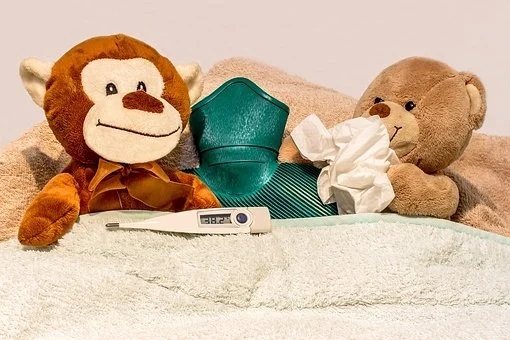Pain relief or NO Pain relief? That is the question...

Children experience pain, both following an injury and through illness. Some children are in pain following surgery in hospital. In all these circumstances, giving your child a pain reliever such as paracetamol or ibuprofen is totally acceptable as it will help control and reduce their pain. Never be tempted to give your child adult medication and always make sure that you don’t overlook the symptoms of serious illness or injury.
* Should we give our children pain relief quickly?
Whilst many health professionals, agree that giving your child pain relief is not a bad thing, they also agree that some parents reach for the pain relievers too quickly.
If your child is running a temperature but is still playing, give them plenty to drink, remove a layer of clothing and monitor their progress. If however they are in pain, seek medical advice straight away.
A quick and effective way to reduce your child’s temperature is to sponge them gently with tepid water.
Teething can be very difficult for many babies but you can soothe their sore gums by rubbing them with one of the specialist creams or giving them an ice pop to suck on. If these steps do not help, then reach for the pain reliever.
Sore bottoms can also be very uncomfortable for babies, but hold off reaching for the pain reliever until you have given your baby a nice soothing bath. Let them go nappy free for a while before applying some specialist nappy cream, followed by a fresh nappy. Change the nappy very regularly for a couple of days and have plenty of nappy-free moments.
Is giving pain relief to children safe?

A recent report found that one in three young children were given an incorrect dose of pain relief.
If you are in any doubt, you should seek the advice of your Health Visitor, Pharmacist or Doctor. If you are needing guidance after hours and live in the UK, you can telephone 111 for advice.
Can you give pain relief to babies?
This should only be done in exceptional circumstances with professional advice. A baby can be given paracetamol when they are at least two months old and weigh more than 4kg. The baby must have also been born after 37 weeks gestation. The dose for a young baby is very different from that of an older baby and paracetamol must be administered very carefully to avoid overdosing.Likewise, Ibuprofen can be used to reduce fever and as a pain relief in babies older than three months and weighing more than 5kg. Again, it is crucial to seek professional advice and to make sure that you administer the correct dosage.
What is the advice of an expert?
Hasantha Gunasekera is a Paediatrician and his advice to parents and child carers is -‘It's important to remember 1) pain is usually a red flag to an underlying problem, and that must also be addressed, and 2) the benefits must be carefully weighed against the risks; liver problems with paracetamol, stomach problems with ibuprofen, and numerous problems with the opioid analgesics like codeine or morphine. Always seek medical advice’
What is the safest way to give children pain relief?
Liquid pain relievers have been specially designed with babies and young children in mind. The best way to give your child medicine is using a special oral syringe and these are obtainable from pharmacists. The syringe is ideal to use as you can very carefully measure the exact amount of medicine you need and is the easiest way to give your child the dose.Soluble tablets are available for older children and these can be dissolved in water. Do not try and give your child tablets to swallow as many people of all ages find this tricky.

What about aspirin?
It is important not to give any child under the age of 16 years, aspirin for pain relief as it is too strong and not designed for children to use and can cause a variety of health issues.How should I store medicines?
It is very important that you store pain relievers and other medicines very carefully so that they do not pose a danger to your children. Medicines should be kept in a clearly marked and secure box. The box should be stored in a cool, dry place that is both out of sight and reach of inquisitive children.The bottom line?
Denying a child in pain and discomfort pain relief is inhumane. If you have tried other methods to help them to no avail, it is perfectly alright to give them pain relief – as long as it is done carefully and is the correct dose for your child’s age and weight. Some of the pain relievers on the market have been designed especially for young children and work quickly to bring pain relief. Your child will not become addicted to them if they are administered properly. Keep a close eye on your child for other symptoms and always seek medical advice if your child is not responding to pain relief.Chrissie x

